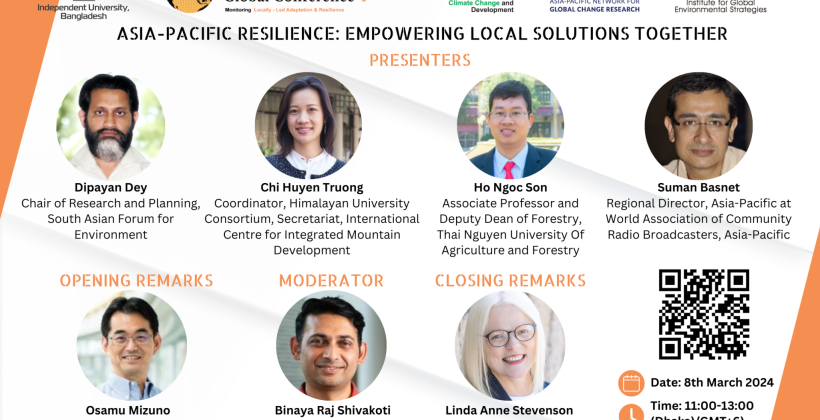The Asia-Pacific Network for Global Change Research (APN), in collaboration with the Institute for Global Environmental Strategies (IGES), hosted the “Asia-Pacific Resilience: Empowering Local Solutions Together” session as part of the Fourth Annual Gobeshona Global Conference. Held on 8th March 2024 from 14:00 to 16:00 (Japan Standard Time), the session aimed to address the multifaceted challenges posed by climate change, resource degradation, and pollution, emphasizing the need for transformative adaptation and resilient communities.
The presentation and the subsequent panel discussion generated a series of insights and conclusions, as outlined below:
Recognition of Community Innovation: The session highlighted the crucial role of communities as innovators and stewards of vital ecosystems. Local solutions such as floating farms and community-based seed banks were showcased as examples of innovative approaches to climate resilience, particularly in marginalized communities.
Importance of Collaborative Partnerships: Effective climate action in mountain regions relies on collaborative partnerships integrating indigenous knowledge with scientific validation. The session emphasized the need for just transitions in education and expanded funding to build soft skills at the local level, ensuring inclusive and scalable solutions.
Empowerment through Monitoring and Evaluation: Monitoring and evaluation were underscored as essential components of community action. Rather than being conducted by external entities, these processes should be integrated into local initiatives, with support from local authorities. Community communication mechanisms, such as community radios, were identified as vital tools for monitoring and evaluation, filling information gaps and fostering community engagement.
Nature-Based Solutions and Adaptive Learning: Implementing nature-based solutions and empowering local communities were highlighted as key strategies for fostering resilience to climate change. By promoting adaptive learning and diverse livelihood strategies, communities can enhance their resilience and adaptability in the face of environmental challenges.
In conclusion, the session emphasised the importance of collective action, community empowerment, and collaboration in building resilient and sustainable futures. By harnessing the creativity and ingenuity of local communities, participants were encouraged to contribute to transformative adaptation efforts and foster climate resilience on a global scale.




